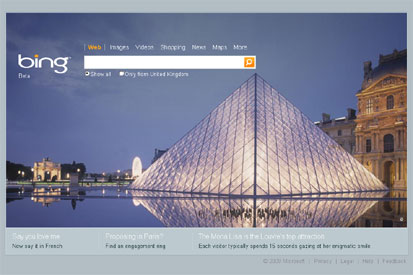
A month after the launch of Bing, JP Morgan analyst Imran Khan, conducted a nationwide (US) survey to assess the success Microsoft's $10 billion Bing bet.
The study concluded that although roughly a quarter of survey respondents were willing to try Bing, the vast majority - more than 98 per cent - will not be switching to Bing as their primary search engine.
Simply put, two thirds of internet users indicated they did not see any weaknesses in their current search experience.
Khan claims Microsoft's biggest battle is to make Bing relevant, and offers a number of suggestions to Microsoft boss Steve Ballmer, chiefly: create a markedly better product and expand its distribution.
It's not like Microsoft hasn't been trying, despite glowing reviews from tech gurus from the Washington Post and the New York Times, and an unprecedented advertising budget, the study reveals it might all be in vain.
Yet it was revealed that the Bing advertising campaign has done its job to raise brand awareness and usage.
More than half of the respondents had heard of Bing and a quarter have used it to search.
However, this behaviour is more typical of testing a new product than making a permanent search engine shift, the study said. Of the respondents who had tried Bing, only 38.9 per cent used it more than five times last month. Consider how many times the average user searches with Google everyday.
Yet, those who tried it, liked it. Of the respondents who had tested Bing, 38.3 per cent listed the relevancy of the results as its greatest strength, with the variety of results including web, maps, images, etc. coming in second at 22.1 per cent.
Speed, organisation of the results page, and the user interface also received positive reviews.
And it's true, Bing has been incrementally gaining market share since it launched in June. But the study also found that most of those users switching over to Bing are likely coming from AOL or Ask.com.
Khan said: "Going forward, 11.4 per cent of respondents believe they will use Bing more than 15 times a month, which is only a 220 bp increase to comparable Microsoft usage prior to the launch of Bing.
"Asked another way, 9.4 per cent of respondents expect to use Bing as their primary search engine in the future vs Microsoft's current primary usage by 7.1 per cent participants. We expect most of the market share gain to be at the expense of AOL and Ask."



_1.jpg)
.jpg)
